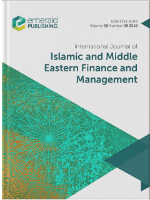
International Journal of Islamic and Middle Eastern Finance and Management
Scope & Guideline
Advancing Knowledge in Islamic and Middle Eastern Financial Systems.
Introduction
Aims and Scopes
- Islamic Finance Theory and Practice:
Explores theoretical frameworks and practical applications of Islamic finance, covering topics from banking to investment and zakat. - Impact of Islamic Principles on Economic Development:
Examines how Islamic principles can influence economic growth, sustainable development, and social welfare within various contexts. - Comparative Analyses of Islamic and Conventional Financial Systems:
Analyzes differences and similarities between Islamic and conventional banking and finance systems, including risk management and governance. - Financial Inclusion and Microfinance:
Focuses on the role of Islamic finance in promoting financial inclusion, particularly through microfinance initiatives and products tailored for underserved populations. - Corporate Governance in Islamic Finance:
Investigates governance structures within Islamic financial institutions and their implications for performance and risk management. - Sustainability and Ethical Finance:
Addresses the integration of sustainability and ethical considerations within Islamic finance, including the role of ESG (Environmental, Social, and Governance) factors.
Trending and Emerging
- Fintech and Islamic Finance:
The rise of fintech innovations in Islamic finance is a prominent theme, reflecting the industry's adaptation to new technologies and digital financial solutions. - Sustainable Finance and ESG Integration:
There is a growing emphasis on how Islamic finance can contribute to sustainability goals, with research exploring the integration of ESG principles into Islamic financial products. - Social Finance and Poverty Alleviation:
Emerging studies focus on the role of Islamic finance in social welfare and poverty alleviation, particularly through microfinance and waqf initiatives. - Impact of Global Events on Islamic Finance:
Research addressing the effects of global crises, such as the COVID-19 pandemic, on Islamic finance markets and institutions is gaining traction. - Diversity and Inclusion in Islamic Finance:
Increasing attention is being paid to the role of diversity in Islamic financial institutions, particularly concerning gender and management practices.
Declining or Waning
- Traditional Islamic Banking Models:
Research focused on conventional models of Islamic banking is less prevalent, as newer studies explore innovative and technology-driven approaches, such as fintech. - Islamic Finance in Non-Muslim Contexts:
There is a noticeable decrease in studies examining the application of Islamic finance principles in non-Muslim countries, indicating a potential narrowing of focus. - Historical Perspectives on Islamic Finance:
Research that primarily focuses on the historical evolution of Islamic finance is less emphasized, as contemporary applications and innovations take precedence. - Single-Country Studies:
There is a trend away from research that focuses solely on individual countries, with a growing interest in comparative and regional studies. - Basic Shariah Compliance Issues:
Basic discussions around Shariah compliance appear to be waning, with more sophisticated analyses of governance and operational frameworks becoming prevalent.
Similar Journals
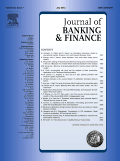
JOURNAL OF BANKING & FINANCE
Your Gateway to Cutting-Edge Financial ResearchWelcome to the Journal of Banking & Finance, a premier publication in the fields of finance and economics, expertly published by Elsevier. With its esteemed Q1 ranking in both the Economics and Econometrics and Finance categories for 2023, this journal frequently garners significant attention from researchers, professionals, and academics alike. Established in 1977, it has become a crucial resource for the latest research and advancements in banking and financial services, influencing policies and practices on a global scale. The journal's commitment to high-quality, peer-reviewed content ensures that it not only contributes to academic discourse but also drives real-world financial innovation. As part of the respected Elsevier publishing collection, the journal's rigorous standards and comprehensive analysis serve as indispensable tools for those seeking to understand and navigate the complexities of the financial landscape. Located in the Netherlands, the Journal of Banking & Finance continues to play a vital role in shaping the future of financial research through its impactful insights and research contributions.
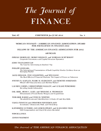
JOURNAL OF FINANCE
Connecting theory to practice in the world of finance.JOURNAL OF FINANCE, published by Wiley, stands as a premier academic journal in the fields of finance, economics, and accounting. With a history dating back to 1946, the journal has consistently delivered impactful research that shapes financial theory and practice, boasting an impressive impact factor reflective of its high citation rate. Its Quartile 1 ranking in Accounting, Economics and Econometrics, and Finance illustrates its leading position within these disciplines. Although not an open access publication, the journal continues to be indispensable for researchers, professionals, and students seeking to advance their understanding and knowledge through rigorous empirical analysis and comprehensive reviews. With an esteemed global readership, the JOURNAL OF FINANCE remains committed to fostering the dissemination of innovative financial research well into 2024 and beyond.
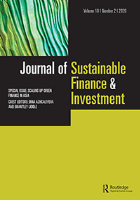
Journal of Sustainable Finance & Investment
Pioneering Insights in Sustainable Investment and FinanceThe Journal of Sustainable Finance & Investment, published by Routledge Journals, Taylor & Francis Ltd, stands as a premier academic platform dedicated to advancing research in sustainable finance and investment practices. With an ISSN of 2043-0795 and E-ISSN of 2043-0809, this journal has carved out a significant niche in the landscape of interdisciplinary finance studies since its inception in 2011. Located in the United Kingdom, it is distinguished by its impressive quartile ranking of Q1 across prominent categories, including Business and International Management, Economics, Econometrics and Finance, and Finance. The journal boasts an exceptional Scopus rank, sitting in the top-tier percentile in multiple fields, underscoring its rigorous academic standards and the impact of its published research. Aimed at researchers, professionals, and students passionate about finance's role in promoting sustainability, the journal prioritizes innovative studies that interface financial systems with social and environmental imperatives. Although it currently does not offer Open Access, it remains a crucial resource for accessing cutting-edge insights and shaping sustainable investment practices globally.

International Journal of Economics Management and Accounting
Bridging Theory and Practice in a Collaborative EnvironmentThe International Journal of Economics Management and Accounting, published by IIUM PRESS, is a pivotal platform for researchers, professionals, and students engaged in the vibrant fields of economics, management, and accounting. With an ISSN of 1394-7680, this journal aims to disseminate high-quality research that addresses both theoretical and practical challenges within these disciplines. As an open-access journal, it facilitates greater accessibility to scholarly articles, fostering a collaborative academic environment. The journal welcomes original research, reviews, and commentaries that contribute to the understanding of complex economic systems, effective management practices, and innovative accounting methodologies. Its commitment to advancing knowledge in these areas underscores its importance in the global academic landscape, particularly within the ASEAN region. Submissions are encouraged from a diverse range of perspectives, thus ensuring a rich dialogue among scholars and practitioners alike.
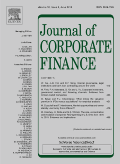
JOURNAL OF CORPORATE FINANCE
Elevating Knowledge in Corporate Finance and EconomicsJOURNAL OF CORPORATE FINANCE, published by Elsevier, is a premier academic journal that represents the forefront of research in the fields of corporate finance, economics, and management strategies. With an impressive Q1 ranking across multiple categories and a 95th percentile standing in Scopus rankings, this journal is pivotal for advancing knowledge and fostering discourse among scholars, practitioners, and students globally. The Journal has been in continuous publication since 1994 and welcomes submissions that contribute to the understanding of corporate finance and related disciplines. Although it operates under a traditional access model, the Journal offers a rich repository of research outcomes pivotal for informed decision-making in corporate environments. Researchers and professionals looking to enhance their understanding of contemporary finance phenomena will find the JOURNAL OF CORPORATE FINANCE an invaluable resource.
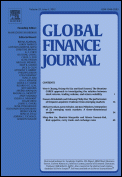
Global Finance Journal
Illuminating critical issues in global finance.Global Finance Journal is an esteemed periodical published by Elsevier, dedicated to the dynamic fields of finance and economics. With an impressive history spanning from 1989 to 2024, this journal holds a significant position in the academic community, boasting a Q1 quartile ranking in both Economics and Econometrics, as well as Finance, as of 2023. It is highly regarded in Scopus rankings, placing 40th out of 317 in Finance and 99th out of 716 in Economics and Econometrics, demonstrating its influence and reach among researchers and practitioners alike. Although not an open-access journal, the Global Finance Journal provides rigorous peer-reviewed articles that explore critical issues, advance theoretical frameworks, and address practical applications in global finance. As such, it serves as a vital resource for researchers, financial professionals, and students aiming to deepen their understanding of economic phenomena and contribute to the ongoing discourse in these vibrant disciplines.

Asian Academy of Management Journal of Accounting and Finance
Advancing Knowledge in Accounting and FinanceThe Asian Academy of Management Journal of Accounting and Finance, published by PENERBIT UNIVERSITI SAINS MALAYSIA, is a pivotal open-access platform that has been disseminating valuable insights in the field of accounting and finance since its inception in 2006. With an emphasis on the unique economic landscape of Asia, this journal provides a forum for researchers and practitioners to contribute innovative research and critical analyses. Hailing from Malaysia, it boasts an E-ISSN of 2180-4192 and continues to be a significant resource for academics, professionals, and students alike. Regularly updated and accessible since 2012, the journal offers an increasing repository of knowledge, as indicated by its Scopus rankings in both the Finance and Accounting segments, with respective ranks of 197/317 and 121/176. Despite its recent Q4 and Q3 quartile standings for 2023, the journal demonstrates a commitment to elevate research quality and influence within the respective disciplines. For those interested in expanding their understanding of contemporary issues in accounting and finance, the Asian Academy of Management Journal stands as an essential scholarly resource.
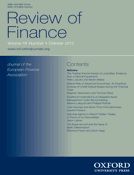
Review of Finance
Elevating academic discourse in finance and economics.The Review of Finance, published by Oxford University Press, stands as a premier academic journal in the fields of Finance, Accounting, and Economics. With an ISSN of 1572-3097 and an impressive track record stretching from 2001 to 2024, this journal is consistently recognized for its high-quality research, reflected in its Q1 rankings across key categories, including Accounting, Finance, and Economics and Econometrics. The Review of Finance is dedicated to advancing the understanding of financial phenomena through robust empirical and theoretical insights, making it an essential resource for researchers and professionals alike. Additionally, its strong Scopus rankings, placing it in the top percentiles, highlight its influence and relevance in ongoing academic discourse. Although the journal is not open access, it remains widely accessible through academic institutions, ensuring that its valuable contributions reach an extensive audience. The editorial board invites submissions that promise to further engage the academic community in the dynamic intersections of finance, accounting, and economic research.
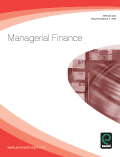
MANAGERIAL FINANCE
Bridging Theory and Practice in Financial Management.MANAGERIAL FINANCE is a prestigious academic journal published by Emerald Group Publishing Ltd, focused on the areas of finance, management, and strategy. With an ISSN of 0307-4358 and an E-ISSN of 1758-7743, this journal has carved a niche for itself within the business and financial sectors, achieving a commendable Q2 category ranking across multiple domains, including Business, Management and Accounting, Finance, and Strategy and Management, as of 2023. The journal aims to provide a platform for insightful research and critical analysis while fostering an understanding of contemporary financial practices and theories. With its wide-ranging scope, it serves as a vital resource for researchers, professionals, and students alike, looking to stay abreast of the latest trends and challenges in managerial finance. The editorial board is committed to maintaining academic rigor, ensuring that articles published are of the highest quality and relevance to the field. By bridging the gap between theory and practice, MANAGERIAL FINANCE is an essential reference for anyone involved in financial decision-making and strategic management.
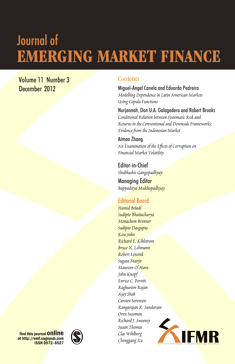
Journal of Emerging Market Finance
Transforming Perspectives on Emerging Market FinanceThe Journal of Emerging Market Finance, published by SAGE Publications India Pvt Ltd, is a premier academic journal that serves as a vital resource for researchers, professionals, and students in the fields of finance and economics. Established in 2002, this journal focuses on the multifaceted dynamics of emerging market economies and their financial systems. With an ISSN of 0972-6527 and an E-ISSN of 0973-0710, it has garnered attention with its respectable Q3 rankings in both the Economics and Econometrics and Finance categories, reflecting its commitment to high-quality research. Despite its limited open-access options, the journal remains a significant platform for scholarly discussions, providing insights on emerging financial instruments, market behaviors, and economic policies in developing economies. As a continuously evolving publication, it aims to bridge the gap between theory and practice, promoting an understanding of the complexities faced in these vibrant markets, ultimately serving the academic community with relevant and impactful research until 2024 and beyond.